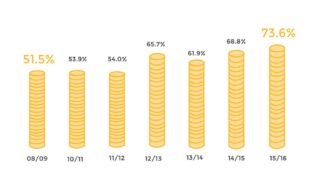Manchester’s progressive procurement enables growth and tackles poverty

Manchester City Council is playing a pioneering role in reinvesting spend back into the local economy, according to a new report published today by the Centre for Local Economic Strategies (CLES) and launched at an event at Manchester Town Hall.
The Power of Procurement II, reflects on ten years of work carried out by Manchester City Council in partnership with CLES, to harness progressive procurement for the benefit of Greater Manchester’s residents and businesses.
It particularly identifies the key changes that have been undertaken in procurement policy and process, and the benefits achieved for the local authority, the supply chain, and the economy and residents of Manchester as a result.
Key changes and impacts include:
- The new Corporate Procurement Department has led to over £65million of efficiency savings;
- Manchester is now seen as an example of best practice when it comes to progressive procurement in the UK;
- Manchester City Council and indeed the wider Greater Manchester Combined Authority are at the forefront of practice around social value;
- The proportion of total procurement spend with organisations based in, or with a branch in Manchester has increased from 51.5% in2008/09 to 73.6% in 2015/16;
- Spend with organisations based in, or with a branch in Greater Manchester has increased from 86.5% to 90.7%;
- 53.3% of Manchester City Council’s procurement spend is with SMEs;
- Re-spend by suppliers back into the Manchester economy has increased from 25p in the £1 in 2008/09 to 43p in the £1 in 2015/16
The proportion of total procurement spend with organisations based in, or with a branch in Manchester has increased by 22.1% in 7 years.

In addition to the direct benefits, the core findings from the 2015/16 analysis were that in the last year, the top 300 suppliers to Manchester City Council created or offered an estimated:
- 20,638 hours of volunteering & community activities;
- 262 apprenticeships in Manchester;
- 334 employment opportunities for ‘hard to reach’ individuals;
- 47,875 hours of support to the voluntary & community sector;
- 1,481 jobs in Manchester;
The report goes on to detail next steps for Manchester City Council in ensuring that progressive procurement policy and practice remains part of the mainstream, and explores the key success factors identified from the approach of Manchester City Council and the lessons learnt for others wishing to pursue a progressive approach to procurement processes and practice.
Matthew Jackson, Deputy Chief Executive of the Centre for Local Economic Strategies said:
‘We are really proud to have worked in partnership with Manchester City Council for the last ten years to instigate such significant change for the benefit of local people and business. The work demonstrates the importance of understanding where procurement spend goes, linking procurement to economic development, and influencing the supply chain to enhance their social value. The work must continue with more progressive procurement being at the heart of devolution and public service reform across Greater Manchester.
Councillor Carl Ollerhead, who chaired the task and finish group which produced the council’s ethical procurement policy, said:
‘As a Council we are determined to ensure that anything we spend delivers the maximum social and economic benefit for Manchester. Our ethical procurement policy obliges us to bear this in mind whenever we are buying goods or services. These figures are extremely encouraging and suggest that we are continuing to make good progress and helping to support thousands of jobs in Manchester. We will work hard to continue, and further improve, this.’
Read The Power of Procurement II: The policy and practice of Manchester City Council